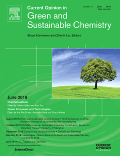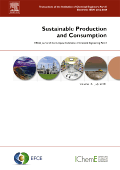
BioEnergy Research
Scope & Guideline
Empowering Sustainable Solutions in Bioenergy
Introduction
Aims and Scopes
- Biomass Utilization and Valorization:
Research on the efficient use of various biomass sources, including agricultural residues, dedicated energy crops, and waste materials, for bioenergy production and value-added products. - Biofuels Production Technologies:
Exploration of different technologies for biofuel production, including enzymatic hydrolysis, fermentation, transesterification, and pyrolysis, aimed at enhancing yield and efficiency. - Sustainable Bioprocessing and Circular Economy:
Investigation into sustainable bioprocesses that integrate waste management and resource recovery, promoting circular economy principles in bioenergy systems. - Microbial and Enzymatic Processes:
Studies focusing on microbial and enzymatic pathways for biomass conversion, including biohydrogen and biogas production, as well as biocatalysis for biofuels. - Life Cycle Assessment and Economic Viability:
Analysis of the environmental impacts and economic feasibility of bioenergy systems through life cycle assessment methodologies. - Innovative Pretreatment Methods:
Development and evaluation of new pretreatment techniques to enhance biomass digestibility and biofuel production efficiency. - Machine Learning and Data-Driven Approaches:
Application of advanced data analytics, modeling, and machine learning techniques to optimize bioenergy production processes.
Trending and Emerging
- Advanced Biomass Pretreatment Techniques:
Emerging research on innovative pretreatment methods, such as ionic liquids and microwave-assisted processes, aims to enhance biomass digestibility and biofuel yields. - Microalgae and Wastewater Treatment:
Increasing interest in utilizing microalgae for biofuel production while simultaneously treating wastewater, highlighting the dual benefits of resource recovery and environmental remediation. - Biomass for Carbon Capture and Utilization:
Exploration of biomass as a means for carbon capture and its subsequent utilization in bioenergy production, addressing climate change concerns. - Integration of Machine Learning in Bioenergy Processes:
The application of machine learning and artificial intelligence to optimize bioenergy production processes, modeling, and predictive analytics is gaining momentum. - Circular Bioeconomy Models:
Research focusing on circular economy frameworks that emphasize waste valorization, resource efficiency, and sustainability in bioenergy systems is increasingly prevalent. - Techno-Economic Assessments:
A growing number of studies are emphasizing the economic viability and sustainability of bioenergy technologies through comprehensive techno-economic assessments.
Declining or Waning
- First-Generation Biofuels:
Research focusing on first-generation biofuels, such as those derived from food crops, has waned as the industry shifts towards more sustainable second- and third-generation biofuels to mitigate food versus fuel debates. - Traditional Biomass Combustion Technologies:
There has been a decrease in studies centered on conventional biomass combustion methods as newer technologies and cleaner alternatives gain traction in the quest for renewable energy. - Single-Fuel Systems:
The focus on mono-feedstock systems has declined in favor of integrated approaches that utilize multiple biomass sources, enhancing feedstock flexibility and sustainability. - Basic Biomass Characterization:
While fundamental studies on biomass properties are still relevant, there is less emphasis on basic characterization as more applied research on biomass conversion processes takes precedence. - Conventional Anaerobic Digestion Techniques:
Research on traditional anaerobic digestion processes is less prominent, as innovations and improvements in reactor designs and co-digestion strategies become the focal point.
Similar Journals

Biomass Conversion and Biorefinery
Transforming biomass into sustainable energy solutions.Biomass Conversion and Biorefinery, published by Springer Heidelberg, is a prominent peer-reviewed journal dedicated to advancing the field of renewable energy and sustainable practices. With ISSN 2190-6815 and E-ISSN 2190-6823, this journal serves as a vital platform for researchers, professionals, and students focusing on the valorization of biomass and the development of biorefinery technologies. Notably, it holds a respectable impact factor and is categorized in the Q2 quartile of Renewable Energy, Sustainability and the Environment, indicating its strong influence within the academic community. Covering a wide range of topics from biomass feedstock characterization to innovative bioconversion processes, the journal aims to facilitate interdisciplinary collaboration and knowledge exchange. As it spans in scope from 2011 to 2024, audience members can benefit from timely research insights that contribute to sustainable energy solutions in a world increasingly focused on environmental stewardship.

Current Opinion in Green and Sustainable Chemistry
Transforming Chemistry with Sustainable MethodologiesCurrent Opinion in Green and Sustainable Chemistry, published by Elsevier, is a premier journal dedicated to exploring the rapidly evolving field of green and sustainable practices in chemistry. With an impressive Q1 ranking in multiple categories, including Catalysis, Process Chemistry and Technology, and Waste Management, this journal plays a pivotal role in disseminating innovative research by providing critical insights into sustainable methodologies and their implementation across various industries. The journal aims to gather leading perspectives from experts to facilitate knowledge exchange that drives the global transition towards more sustainable chemical practices. Based in the Netherlands, Current Opinion in Green and Sustainable Chemistry emphasizes high impact, evidenced by its Scopus ranks, notably achieving the 10th percentile in Environmental Science Management, making it indispensable for researchers and professionals keen on advancing sustainable chemistry solutions. This journal offers a blend of open access articles and subscription-based content, ensuring a wide reach and engagement with its audience.

Korean Chemical Engineering Research
Fostering Insights from Korea's Chemical Engineering FrontierKorean Chemical Engineering Research, published by the Korean Institute of Chemical Engineers, serves as a vital resource for those engaged in the expansive field of chemical engineering. With an ISSN of 0304-128X and an E-ISSN of 2233-9558, the journal offers a platform for scholarly articles that cover various aspects of chemical processes, innovative technologies, and sustainability practices in engineering. Despite being in the Q4 category of chemical engineering journals as per the 2023 rankings, the journal's focus on emerging research from South Korea and beyond presents unique insights valuable to professionals, researchers, and students alike. Operating under effective citation metrics, it finds its place within Scopus, ranking at 229 out of 273, indicating a niche yet specialized contribution to the broader scientific community. We invite you to explore this integral journal, which is committed to fostering discourse and development in chemical engineering through its extensive archive, dating back to 2014 and continuing to evolve through 2023.

Sustainable Production and Consumption
Innovating Pathways to Sustainable LivingWelcome to Sustainable Production and Consumption, a premier journal published by Elsevier in the vibrant field of sustainability and environmental science. With an ISSN of 2352-5509, this journal has established itself as a leading platform for innovative research and discourse on sustainable manufacturing, consumption practices, and environmental technologies. As evidenced by its impressive 2023 rankings—Q1 in Environmental Chemistry, Environmental Engineering, Industrial and Manufacturing Engineering, and Renewable Energy, Sustainability and the Environment—the journal ranks among the top tier of its field. Researchers and professionals alike are invited to explore the journal’s rigorous peer-reviewed articles, which aim to advance the understanding and implementation of sustainable practices across various industries. With a strong commitment to disseminating impactful research, Sustainable Production and Consumption serves as an essential resource for academics, policy makers, and industry leaders seeking to address the challenges of modern environmental sustainability.

Renewable Energy Focus
Championing Research for a Cleaner, Greener PlanetRenewable Energy Focus is a premier journal published by Elsevier, dedicated to advancing the field of renewable energy and sustainability. With an ISSN of 1755-0084 and an E-ISSN of 1878-0229, this journal serves as a vital platform for researchers, professionals, and students interested in innovative solutions to energy challenges. Established in 2007, the journal has evolved to become a recognized authority in the subject area, currently ranked in the Q2 quartile of its category for 2023, emphasizing its significance in promoting impactful research. The journal encompasses a wide range of topics, including solar, wind, bioenergy, and sustainable practices that contribute to environmental conservation and energy efficiency. As part of Elsevier's commitment to disseminating high-quality research, Renewable Energy Focus is indexed in Scopus, currently holding a rank of #92/270 in the energy sector, positioning it in the 66th percentile of its field. This journal offers an essential resource for those dedicated to fostering sustainable energy solutions.

JOURNAL OF ENERGY ENGINEERING
Connecting Ideas for Sustainable Energy PracticesJOURNAL OF ENERGY ENGINEERING, published by the ASCE-Amer Soc Civil Engineers, serves as a pivotal resource in the fields of civil and structural engineering, energy engineering, and nuclear energy research. With an ISSN of 0733-9402 and an E-ISSN of 1943-7897, this esteemed journal demonstrates a consistent commitment to advancing knowledge in energy systems, sustainability, and waste management. Ranking within the second quartile in several categories—including Civil and Structural Engineering and Energy Engineering and Power Technology—this journal maintains a strong reputation, underscored by its Scopus rankings that place it in the top tiers of its discipline. Accessible from 1982 through 2024, the journal provides researchers and professionals meaningful insights through rigorously peer-reviewed articles, critical reviews, and case studies that address contemporary challenges in energy utilization and infrastructure development. Without open access options, it ensures the integrity and credibility of published work, showcasing influential research that contributes to sustainable solutions in energy and environmental frameworks. Researchers, professionals, and students alike will find the JOURNAL OF ENERGY ENGINEERING an indispensable platform for exploration and dissemination of innovative ideas within the realm of energy and engineering.

Journal of Agricultural Machinery
Bridging Research and Application in Agricultural MachineryJournal of Agricultural Machinery, published by FERDOWSI UNIVERSITY MASHHAD PRESS, is a premier Open Access journal that has been serving the agricultural engineering community since 2011. This journal is dedicated to disseminating cutting-edge research, innovative practices, and technological advancements related to agricultural machinery. With an ISSN of 2228-6829 and an E-ISSN of 2423-3943, it provides a vital platform for researchers and professionals in the field to share their findings and insights. The journal, based in Iran at the Ferdowsi University of Mashhad, aims to bridge gaps between research and application, enhancing productivity in agriculture through improved machinery and methodologies. Despite its current Scopus ranking at the lower end of the spectrum, the journal is committed to elevating its impact and expanding its scope, focusing on innovative solutions that address pressing challenges in agricultural practices. As an Open Access resource, it ensures unrestricted availability to scholarly articles, fostering a collaborative environment for growth and learning among researchers, professionals, and students alike.

Biotechnology for Biofuels and Bioproducts
Bridging Science and Sustainability for a Cleaner FutureBiotechnology for Biofuels and Bioproducts is a premier international journal published by BMC, situated in the United Kingdom, focusing on the critical intersection of biotechnology and sustainable energy solutions. Established as an Open Access platform in 2022, this journal aims to disseminate high-quality research that advances our understanding of biofuels, bioproducts, and their applications within environmental sustainability. With its commendable Q2 ranking in multiple relevant categories including Applied Microbiology and Biotechnology and Renewable Energy, this journal serves as a vital resource for researchers, industry professionals, and students seeking to explore innovative biotechnological approaches to address global energy challenges. The journal emphasizes interdisciplinary research, fostering collaboration among scientists in biotechnology, environmental science, and policy-making. As it continues to publish impactful findings until 2024, Biotechnology for Biofuels and Bioproducts remains essential for those dedicated to advancing sustainable methodologies in energy and resource management.

BIOPROCESS AND BIOSYSTEMS ENGINEERING
Fostering Innovation in Bioprocessing and EngineeringBIOPROCESS AND BIOSYSTEMS ENGINEERING is a prestigious journal published by Springer, dedicated to advancing the field of bioengineering and biotechnology. Established in 1996, this influential journal provides a platform for disseminating high-quality research that covers a wide spectrum of topics related to bioprocessing, biosystems, and their applications in medicine and environmental engineering. With an impressive impact factor and ranking in the top quartile (Q2) across bioengineering, biotechnology, and miscellaneous medical fields, BIOPROCESS AND BIOSYSTEMS ENGINEERING stands out as a critical resource for researchers, professionals, and students. The journal is indexed in Scopus, reflecting its significant contribution to the scientific community, particularly with its robust percentile rankings (77th in Biotechnology and 70th in Bioengineering). Available in both print and electronic formats, this journal ensures accessible research for those pushing the boundaries of knowledge in bioprocessing and biosystems. As it continues to evolve, BIOPROCESS AND BIOSYSTEMS ENGINEERING encourages submissions that contribute to innovative research practices and applications, thereby fostering academic collaboration and advancement in this dynamic field.

Green Chemical Engineering
Innovating chemical engineering for a sustainable future.Green Chemical Engineering, an esteemed journal published by KEAI PUBLISHING LTD, plays a pivotal role in advancing the field of sustainable chemical engineering. With an Open Access policy since 2020, this journal facilitates the free exchange of cutting-edge research and innovations that address critical environmental challenges. Based in China, it has rapidly gained recognition with impressive category quartiles, ranking Q1 in numerous relevant fields including Catalysis, Chemical Engineering (miscellaneous), Filtration and Separation, and Process Chemistry and Technology. Its presence in Scopus highlights its significance, with top rankings (e.g., Rank #4/19 in Filtration and Separation) placing it in the upper echelons of chemical engineering literature. Designed for researchers, professionals, and students alike, Green Chemical Engineering aims to foster a collaborative platform for the dissemination of pioneering work that contributes to a greener and more sustainable future.